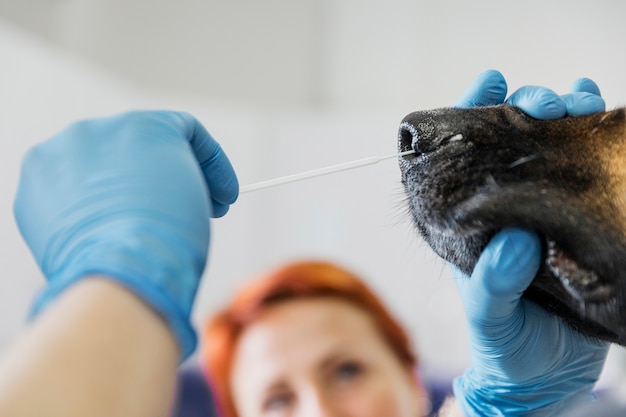Heartworm Testing for Dogs and Cats: What Pet Owners Need to Know

Heartworm Testing for Dogs and Cats: What Pet Owners Need to Know
Heartworm disease is a serious and potentially life-threatening condition that affects both dogs and cats, yet it often goes unnoticed until advanced stages. Whether you are a new pet parent or have shared years with your furry companion, understanding heartworm testing is essential for their long-term health and happiness. At AM PM Ideal Pet Care in Norwalk, CA, our team of experienced veterinarians is dedicated to protecting your pets with thorough preventive care, including routine heartworm testing.
In this blog, you will discover why heartworm testing is so important, how the process works for both dogs and cats, and when to schedule testing for optimal wellness. You will also learn about the local risks in Norwalk and surrounding communities, what symptoms to watch for, and simple steps you can take at home to keep your pet safe year-round. If you’ve ever searched for a “vet near me” who truly prioritizes your pet’s health, our veterinary professionals are committed to providing comprehensive care and guidance tailored to your needs. For those seeking more detailed service options, our heartworm testing services for dogs and cats page offers further information about protection and prevention.
Recognizing the Problem: Signs Your Pet May Need Heartworm Testing
Many pet owners are surprised to learn that heartworm disease can develop with few or no early symptoms. This is why regular heartworm testing in Norwalk, CA is crucial; it allows veterinarians to detect an infection before it leads to irreversible damage. Key symptoms in dogs might include a persistent cough, noticeable fatigue after moderate activity, reduced appetite, and weight loss. As the disease progresses, dogs may develop a swollen abdomen due to fluid accumulation or even experience fainting episodes.
Cats present a unique challenge, as their symptoms can be subtle or mimic other conditions. Signs to watch for in cats may include sporadic coughing, rapid or labored breathing, vomiting that is not related to eating, loss of appetite, and sudden lethargy. In some unfortunate cases, a seemingly healthy cat may suffer sudden collapse or death, highlighting the importance of proactive heartworm testing near me and in surrounding communities.
Heartworm disease does not discriminate based on age, breed, or whether your pet spends most of their time indoors. Even indoor cats and dogs are at risk because mosquitoes—the carriers of heartworm larvae—can easily enter homes through open doors, windows, or tiny cracks. If you notice any of the symptoms mentioned or if your pet’s lifestyle puts them at risk, contacting our veterinary professionals for timely heartworm testing is the best way to ensure peace of mind.
Understanding Heartworm Disease: How Pets Become Infected
Heartworm disease is caused by the parasite Dirofilaria immitis, which is transmitted to pets through the bite of an infected mosquito. When a mosquito feeds on a heartworm-positive animal, it picks up microscopic larvae that develop inside the insect. These larvae are then passed on to the next pet the mosquito bites, where they migrate through the bloodstream and settle into the heart, lungs, and associated blood vessels.
The lifecycle of heartworms is complex; after entering your pet, it takes several months for the larvae to mature into adult worms. In dogs, these worms can grow up to a foot long and live for several years, causing ongoing damage to the heart and lungs. Cats are less hospitable hosts, but even a small number of worms or immature larvae can provoke severe inflammatory responses, leading to respiratory distress or sudden death.
Environmental factors in Norwalk, CA and the surrounding areas make heartworm a year-round concern. Warm weather and local mosquito populations mean that pets are at risk for much of the year, not just during summer. Even during colder months, indoor heating and unexpected warm spells can allow mosquitoes to survive longer than you might expect. This is why veterinarians recommend consistent prevention and regular heartworm testing in Norwalk, CA regardless of the season.
The Heartworm Testing Process: What to Expect at Your Appointment
When you schedule a heartworm test for your pet at AM PM Ideal Pet Care, our veterinary team will guide you through each step of the process. For dogs, heartworm testing typically involves a simple blood draw, which is analyzed for the presence of heartworm proteins (antigens) produced by adult female worms. Results can often be provided during your visit, allowing for prompt discussion of next steps should the test return positive.
For cats, heartworm diagnosis is more challenging, as they may carry only immature worms or a low number of adults. Our veterinarians may recommend a combination of blood tests that detect both antigens and antibodies, as well as imaging procedures such as X-rays or ultrasounds if heartworm infection is suspected. Accurate diagnosis is essential, since heartworm disease can mimic other common feline illnesses.
Our clinic is proud to offer advanced pet diagnostic laboratory services for comprehensive health screening, supporting a complete approach to pet wellness in Norwalk, CA. During your appointment, we will review your pet’s history, discuss any symptoms, and create a tailored care plan based on their unique risk factors and lifestyle.
Prevention and Home Care: Keeping Your Pet Protected Year-Round
The most effective way to safeguard your pet from heartworm disease is through a combination of timely testing and year-round preventive medication. For dogs and cats, preventive options may include monthly oral or topical treatments, as well as annual injections for certain cases. Our veterinarians will help you select the most appropriate product for your pet, taking into account their age, health status, and lifestyle.
Preventive care does not end with medication alone. Regular heartworm testing near me is recommended even for pets on prevention, since no product is 100 percent effective and missed doses can leave your pet vulnerable. For dogs, annual testing is standard, while cats may require more individualized testing schedules depending on their exposure risk.
At home, you can further reduce the risk of infection by minimizing your pet’s exposure to mosquitoes. Actions such as using screens on windows, eliminating standing water around your property, and keeping pets indoors during peak mosquito hours can help. However, because even indoor pets are at risk, these measures should complement—not replace—routine veterinary care.
For those interested in a comprehensive approach to pet wellness Norwalk, CA, our team can incorporate heartworm prevention into broader health plans. This may include recommendations for vaccinations, regular checkups, and parasite screenings to ensure your pet remains healthy and active throughout all seasons.
When to Seek Veterinary Care: Recognizing Urgency and Next Steps
If you suspect your pet has been exposed to heartworm disease or notice any of the warning signs described earlier, prompt veterinary attention is essential. Heartworm infection can progress unnoticed for months, causing irreversible damage to the heart and lungs. Delaying care may reduce the chances of successful treatment, particularly in advanced cases.
You should schedule heartworm testing in Norwalk, CA for your pet if they have missed preventive doses, been adopted from a shelter or rescue, traveled to areas with a high mosquito population, or if it has been more than a year since their last test. Puppies and kittens should also be tested before starting preventive medication, and newly adopted pets should have baseline screening as part of their initial wellness evaluation.
Our veterinary professionals are available to answer your questions, help you assess your pet’s risk, and provide individualized recommendations. If your pet tests positive, our team will outline a treatment plan that prioritizes their safety and comfort. Early detection and intervention are key; the sooner heartworm disease is identified, the better the outcome for your furry companion.
For urgent situations or if your pet is experiencing severe symptoms such as difficulty breathing or sudden collapse, do not wait for a routine appointment—call our clinic immediately for guidance.
Heartworm Testing in Norwalk, CA: Your Partner in Pet Wellness
Heartworm disease is a preventable threat, but it requires ongoing vigilance and collaboration between pet owners and veterinary professionals. By prioritizing regular heartworm testing and preventive care, you can ensure your pet enjoys a long, happy, and healthy life in Norwalk and surrounding communities. At AM PM Ideal Pet Care, we are proud to be the trusted choice for those seeking the best veterinarian near me, with a strong focus on pet wellness Norwalk, CA.
If you are ready to schedule your pet’s next heartworm test, discuss preventive options, or simply have questions about your pet’s health, our compassionate veterinary team is here to help. We invite you to learn more about our heartworm testing services for dogs and cats or explore our pet vaccination services as part of your pet’s comprehensive care plan. For personalized assistance, call our Norwalk animal hospital at (562) 282 9639 or visit us in person at Norwalk, CA.
Protecting your pet starts with a simple step—routine heartworm testing in Norwalk, CA. Let us be your partner in ensuring your pet’s lifelong wellness and happiness.
Disclaimer: This blog is intended for informational purposes only and should not be used as a substitute for professional veterinary advice, diagnosis, or treatment. Always consult your veterinarian for specific concerns about your pet’s health. For more information on heartworm disease and prevention, visit reputable sources such as the American Heartworm Society or speak directly with your trusted veterinary team.

















